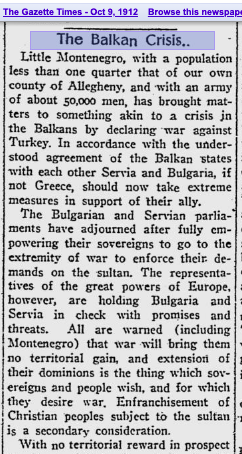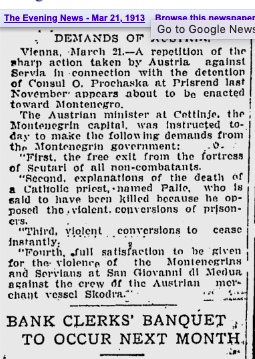
Read the original news stories…
Any perusal of Republican media (Fox News, Pamela Geller…) quickly turns up instances of Saracen berserkers raping, torturing and beheading legally disarmed Christians, never the reverse. The overall impression transmitted is that no True Christian™ ever raised a hand in anger, but rather in sorrow, for purposes of turn-the-other-cheek crucifixion. Is there another, economic, side to this story?
Wearily familiar are the tough love christianization of poor uncovered wretches from Africa and the deliberate extermination of autochthonous Americans before and after the Second Nullification Crisis–the one government historians refer to as the “Civil” War. Yet when was the last time you saw reports from the Balkan Wars? These were genocidal wars that broke out in the opium-producing Balkan States between Italy and Turkey, extending northward from Greece to what was the Austrian Empire back when the Balkans were called the Ottoman Empire.

Read the original newspaper…
These conflicts began during the collapse of narcotic prices after the 1911 revolution in China, after which the Celestials firmly halted the dumping of opiates on their shores. The Balkan wars segued seamlessly into WW1, in which all original belligerents were major participants in the production and marketing of morphine. All parties were enamored of and committed to the initiation of force to achieve their ends.
Only in the late ’80s and 1990s, when Mercantile America and Soviet Russia were exploiting black markets in drugs to finance the Cold War, did the Balkans, once happily forgotten, again obtrude to where they could no longer be ignored. Yet the atrocity reports from both eras are nearly indistinguishable. Indeed, the book in reference is a 1993 annotated reprint!
After China reinstated specific drug prohibitions, Balkan wars surged as a raging turmoil of christians exterminating and “converting” mohammedans and vice-versa. The violence ramped up into what government historians call World War 1. A truce was made by the Versailles Treaty whereby defeated morphine exporters paid tribute–explicitly including “chemical drugs” and cash–to victorious morphine exporters. The 1990s version were a replay nearly identical in all aspects, including the skillful elision of all mention of poppies, opium and morphine. Religious fanaticism, on the other hand, appears on practically every page, though lately euphemized into “ethnic cleansing.”
The 1912-1914 outbreaks were reviewed in 1993 by The Carnegie Endowment–from the folks who in 1930 assembled The Liberal Party that drafted the platform plank calling for repeal of the Prohibition Amendment so intimately bound up with the Crash and Great Depression. The foreword was by George Kennan, the U.S. Chargé d’Affaires in Moscow who in 1946 sent “The Long Telegram” explaining Soviet politics to U.S. diplomats. The Carnegie Endowment for International Peace Division of Intercourse and Education Report of the International Commission to Inquire into the Causes and Conduct of the Balkan Wars is, of course, a cover-up. The word “opium” is even excised from medical lists in the appendices. Yet this is also true of WW1 and WW2 documendacities. Treaties of armistice and surrender and the League of nations Charter could perforce not avoid mentioning this largest causal component of a great many wars, so they are themselves studiously ignored and hardly ever quoted at all except in laundered form.

Read this original newspaper…
Serbian movies feature heroin the way American movies depict marijuana as a component of everyday life. The Peking Daily News recorded in flawless English the progressing escalation of conflicts in Europe. The Balkan wars intensified as British politicians realized no amount of whining would soften Chinese determination. Yesterday’s news has been rectified and elided from the record with Orwellian precision, but can still be exhumed from research libraries and newspaper morgues. Bank statements, not battles, are where one looks to find the roots of war.
Visit my foreign-language blog

